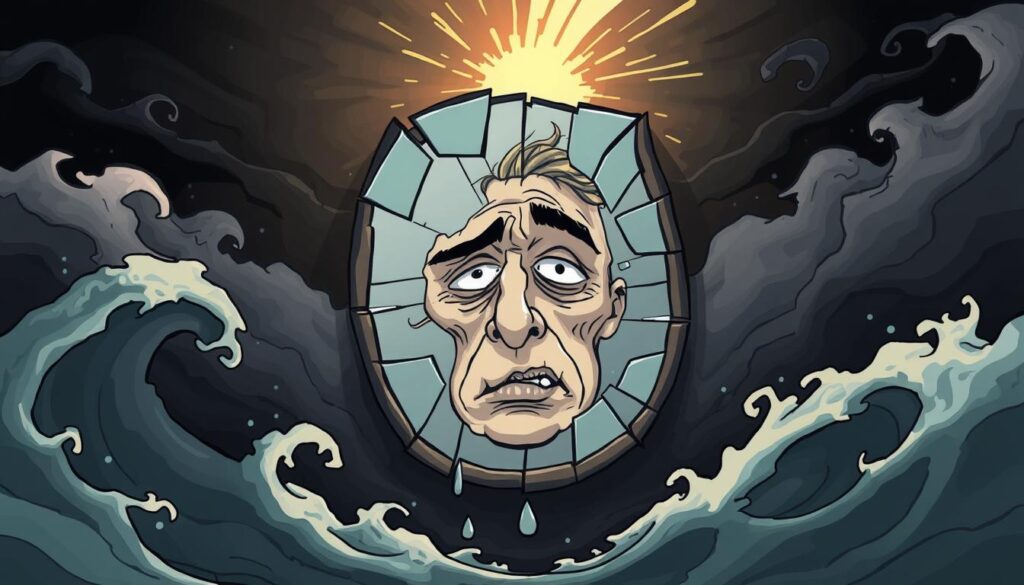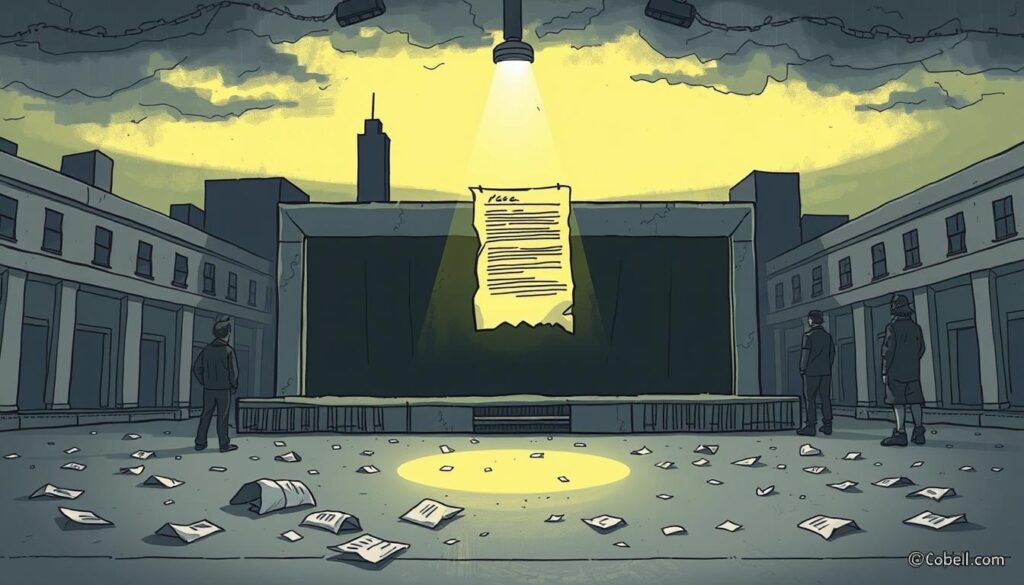Public humiliation can be very hurtful. It can affect your self-esteem, mental health, and reputation. But, with the right steps, you can get back on track. This guide will show you how to overcome public humiliation and use online reputation management (ORM) to restore your image. You’ll learn how to recover and come out stronger.
Key Takeaways
- Understand the impact of public humiliation and its emotional consequences.
- Recognize the signs of public humiliation and address the issue proactively.
- Leverage online reputation management (ORM) strategies to rebuild your online presence.
- Seek professional support and counseling to address the psychological impact.
- Develop resilience and self-esteem to overcome the stigma of public humiliation.
What is Public Humiliation?
Public humiliation is when someone is made to feel ashamed or embarrassed in front of others. It can happen in many ways, like a wardrobe malfunction or a politician’s bad statement. When it happens, the person feels bad about themselves and may have lasting emotional pain.
Questions? Ask for a free consultation to learn how we can help you recover.
Definition and Examples of Public Humiliation
Public humiliation is when someone is openly shamed or degraded. It makes them feel less important or unworthy. Here are some examples:
- A business executive’s mistake being covered extensively in the media
- A politician’s controversial statement being broadcast worldwide
- A wardrobe malfunction during a live performance
These moments can really hurt a person’s feelings and how they see themselves.
| Type of Public Humiliation | Description |
|---|---|
| Pillories and Humiliating Garments | In the past, people were shamed by being put in pillories or forced to wear certain clothes. |
| Public Corporal Punishment | Some places used public flogging or foot whipping to shame and punish people. |
| Digital Shaming | Now, with social media, people can be shamed online, often without knowing it. |
Knowing about the different ways people have been humiliated helps us understand its big impact on people and society.

The Emotional Impact of Public Humiliation
Studies show that humiliation is worse when others watch. Actions like mocking and bullying make it even harder. Victims often feel less valued, which harms their self-esteem and confidence.
Potential Consequences of Public Humiliation
- Depression and mood disorders
- Anxiety and PTSD
- Low self-esteem and loss of self-confidence
- Damaged relationships and social isolation
- Difficulty in personal and professional development
- Increased risk of suicidal behavior
It’s important to know how public humiliation can affect us. Seeking help is key to emotional recovery. With the right support, people can heal and regain their strength and self-worth.

Factors That Can Lead to Public Humiliation
Public humiliation can come from many sources, often linked to our past and personal weaknesses. Learned helplessness is a big factor. It’s when someone keeps facing painful events they can’t change. This can hurt their self-worth and make them more likely to feel ashamed in public.
Social defeat stress is another risk. It happens when someone is always bullied or dominated in key relationships. This can make them very afraid of being rejected and very sensitive to any slight. Being humiliated as a child, like through criticism or being left out, also makes adults more likely to feel humiliated later.
Stressful situations, tech failures, and even wardrobe mishaps can be triggers for public embarrassment and shame. These surprises can leave us feeling exposed and powerless. This makes the feeling of humiliation worse.
It’s important to know the causes of public humiliation, circumstances that lead to public disgrace, and risk factors for experiencing public shaming. This knowledge helps us find ways to prevent and recover from these feelings. By facing our vulnerabilities and learning to handle tough situations, we can build strength and control over how others see us.
| Factors Linked to Public Humiliation | Description |
|---|---|
| Learned Helplessness | A psychological state where an individual repeatedly faces emotionally painful events they cannot control, eroding their sense of self-worth and making them more susceptible to public shame. |
| Social Defeat Stress | A situation where a person is constantly dominated or bullied in important relationships, creating a deep-seated fear of rejection and a heightened sensitivity to perceived social slights. |
| Childhood Experiences of Humiliation | Negative experiences such as parental criticism, learning disabilities, or social exclusion can increase one’s vulnerability to public humiliation in adulthood. |
| High-stress Situations | Unexpected events, technology failures, and wardrobe malfunctions can serve as triggers for public embarrassment and shame, leaving individuals feeling exposed and powerless. |

Knowing these circumstances that lead to public disgrace and risk factors for experiencing public shaming helps us find ways to be stronger. We can learn to handle tough situations and take back control of how we’re seen by others.
Recognizing the Signs of Public Humiliation
Public humiliation can cause deep emotional scars and change behavior. It’s important to know the signs of someone struggling after being shamed. Recognizing these signs helps you support them in healing.
Identifying Emotional and Behavioral Changes
People who have been humiliated may show different emotions and behaviors. Some common signs include:
- Feelings of intense shame, anger, or depression
- Withdrawal from social interactions and avoidance of public settings
- Difficulty concentrating or maintaining focus on daily tasks
- Changes in sleep patterns, such as insomnia or excessive sleeping
- Alterations in appetite, either a loss of appetite or overeating
- Symptoms of post-traumatic stress disorder (PTSD), such as intrusive thoughts, flashbacks, and hypervigilance
These signs are the body’s way of coping with the trauma. It’s key to recognize them and seek help to recover.
| Emotional Indicators | Behavioral Changes |
|---|---|
|
|
Being aware of these changes is the first step to understanding public humiliation’s impact. It helps you find the support needed for healing.

The Importance of Addressing Public Humiliation
Dealing with public humiliation is key for emotional health and recovery. If ignored, it can cause lasting damage. This includes mood disorders, damaged relationships, and career problems.
Untreated, it can lead to hopelessness, increased vulnerability, and even suicidal thoughts. Acknowledging the hurt and seeking support starts the healing process. It helps rebuild self-esteem and reclaim personal and professional lives.
Learn about our services to help you recover from public humiliation.
The long-term effects of not facing public shame are severe. People often feel isolated and ashamed. They struggle to move forward. It’s crucial to get help from mental health experts, support groups, or loved ones.
Ignoring public humiliation can lead to anxiety, depression, and PTSD. Seeking help after a public shame is vital. It’s the first step to regain control, rebuild confidence, and restore reputation.
| Statistic | Data |
|---|---|
| Reported cases of disputes involving commuters not wearing masks in public in Singapore since April 2020 | 80 cases, with about 40 individuals being fined |
| Facebook likes for Stomp, a Singaporean portal for social justice | Over 600,000 likes |
| Likelihood of Singaporeans engaging in public shaming to reinforce social norms | More likely due to tight culture |
| Long-lasting negative effects of public shaming via social media | Loss of reputation, self-esteem, and sense of community belonging |

Addressing public humiliation early on helps individuals take control of their story. It heals emotional wounds and makes them stronger. This journey is tough but vital for long-term well-being and growth.
Strategies for Recovering from Public Humiliation
Getting over public humiliation is tough, but it’s doable with the right help. Seeking advice from mental health experts, like counselors or therapists, is key. They can help you feel confident again and fix your reputation.
Seeking Professional Support and Counseling
Talking to a therapist is very helpful when you’re feeling down after public humiliation. They offer a safe place to talk about your feelings. Professional help can also tackle any mental health issues that might have led to the problem or made it worse.
Robert J. Sternberg, a psychology expert, says being resilient is important to get over public humiliation. A therapist can teach you to be more resilient. They help you feel better about yourself and see challenges as chances to grow.
- Develop healthy coping strategies with the help of a therapist
- Address any underlying mental health issues that may have contributed to the incident
- Build resilience and self-esteem to bounce back from the humiliation
- Utilize the crisis as an opportunity for personal growth and transformation
Getting help from a professional is a big step in recovering from public humiliation. It’s key to overcoming public disgrace. With a mental health expert, you can take back control of your story. You can regain your confidence and come out of this experience stronger.
“Resilience is not just about bouncing back, but about bouncing forward. It’s about using adversity as a springboard for growth and transformation.”
Building Resilience and Self-Esteem
Getting over public humiliation takes hard work to build resilience and self-esteem. It’s about taking care of yourself and feeling good about who you are. Activities like mindfulness, exercise, and making friends help a lot.
It’s key to stop being too hard on yourself and start being kinder. By focusing on your good qualities and accomplishments, you can regain your confidence. This helps you avoid future embarrassments.
Studies show that only 17% of people practice self-compassion to build emotional strength. But, about 68% try to fix their weaknesses instead of focusing on their strengths. Changing this mindset can help you reach your full potential and bounce back from humiliation.
“Fear of public humiliation can lead to social isolation and low self-esteem, affecting personal and professional growth. Cognitive-behavioral therapy (CBT) and exposure therapy can be effective in addressing this fear, helping individuals desensitize and manage their anxiety.”
Being open and good at talking to others also helps build resilience. It lets you form deeper connections and lessens the impact of humiliation. This journey of growth and empowerment is truly transformative.
The road to recovery is not easy, and you might face setbacks. But, being kind to yourself, getting help when you need it, and celebrating small wins is crucial. These steps are key to developing resilience after public humiliation, rebuilding self-esteem after public disgrace, and boosting confidence after public shaming. Taking care of yourself is the most important part of this journey.
The Role of Mindfulness and Self-Compassion
After public humiliation, mindfulness and self-compassion can help a lot. They teach you to be present and accept yourself. This way, you can handle your feelings better and judge yourself less.
Practicing Acceptance and Letting Go
Mindfulness helps you accept all experiences, even the tough ones. By doing this, you can stop trying to control everything. This lets you move on and find your self-worth again.
Doing things that make you feel calm, like meditation or journaling, helps too. These activities help you be kinder to yourself. This kindness is key to healing from public shame.
“The strongest actions for a woman is to love herself, be herself and shine amongst those who never believed she could.”
– Unknown
With mindfulness and self-compassion, you can deal with the emotional pain of public shame better. This leads to a stronger and more real recovery. You can regain your confidence and start anew.
Repairing Relationships and Reputation
Getting over public humiliation means fixing personal and professional relationships. Rebuilding after such a setback is hard but key. Talking openly and honestly is vital to regain trust.
Fixing a damaged reputation involves being proactive and showing your good side. Being true to yourself is crucial in this journey. It helps rebuild trust and respect.
Many professionals help people fix their reputation damage. This field has grown due to the #MeToo movement and social media scrutiny. Setting clear goals is essential for those facing reputation crises.
| Reputation Repair Strategies | Key Considerations |
|---|---|
| Crafting a thoughtful media strategy | Deciding when and how to issue a statement, choosing the right spokesperson, and understanding the impact of media communications. |
| Engaging in social media selectively and strategically | Mishandling social media can exacerbate an individual’s reputation crisis. |
| Exploring all available options in reputation repair | Transparency and public visibility play a significant role in shaping individuals’ reputations. |
Warren Buffett said, “It takes 20 years to build a reputation and five minutes to ruin it.” This shows how fragile reputation is. By facing emotional challenges and using strategies for repair, people can come out stronger.
Public Humiliation and Online Reputation Management
In today’s world, public shame often spreads online. This makes it harder to recover. Online Reputation Management (ORM) helps you take back control and rebuild your online image.
Leveraging ORM to Rebuild Your Online Presence
ORM strategies include making positive content and fixing bad mentions. It also means using SEO to show your true, professional side. By managing your online image, you can regain trust and move past public shame.
The impact of ORM in recovering from public humiliation is huge. Here are some ways to use ORM:
- Keep an eye on your online presence to spot and fix bad content
- Create and optimize positive, professional content to get noticed online
- Join online communities and build a real, strong digital presence
- Use legal ways to remove harmful or false content
It’s crucial to watch and manage your online image after a public setback. By being proactive and using online reputation management, you can regain your reputation and feel confident again.
“A single mistake in the digital age can ruin an individual’s future due to ‘cancel culture,’ which can have demoralizing effects on reputations and second chances.”
Preventing Future Public Humiliation
It’s hard to avoid public humiliation completely, but you can lower your risk. Taking steps to protect your reputation is key. This helps keep your public image safe and reduces the chance of future embarrassment.
Keep an eye on what’s online about you. Search for your name and important keywords. This helps you find and fix any bad stuff fast. A reputation management expert can help remove or lessen the harm.
Improving yourself is also important. Know your strengths and weaknesses well. This self-awareness helps you prepare for situations that might embarrass you.
- Surround yourself with people you trust. They can help and support you when things get tough.
- Take care of yourself. Mindfulness, journaling, and counseling can help you deal with feelings of shame.
- Have a plan ready for when you face public humiliation. Know how to respond and manage the situation.
By being proactive and growing personally, you can lower your risk of public humiliation. Remember, overcoming shame is a journey of growth and empowerment.
| Strategies for Avoiding Future Public Humiliation | Tips for Building Resilience to Public Shaming |
|---|---|
|
|
“The greatest weapon against shame is vulnerability.”
– Brené Brown
The Empowering Journey of Overcoming Public Humiliation
Public humiliation can leave deep scars, but it also offers a chance for growth. By facing the recovery process bravely, people can become stronger and more resilient. They learn to understand themselves better and use these lessons to avoid future embarrassments.
Overcoming public humiliation shows one’s true strength. It proves that humans can bounce back and change. It’s about regaining one’s reputation and self-worth, turning a bad experience into a chance for growth.
Finding Strength in Adversity and Personal Growth
After public humiliation, people face a choice: let shame win or use it as a chance to grow. By seeing public humiliation as a chance for growth, they can find ways to stay strong.
- Cultivate self-compassion and acceptance: Understand that public humiliation is common and self-judgment only makes it worse.
- Explore the root causes: Look into why the humiliation happened to learn and grow from it.
- Embrace vulnerability: Being open can make you stronger by building real connections and self-awareness.
- Celebrate small victories: Acknowledge and celebrate each step towards regaining your reputation and self-worth.
This journey can turn public humiliation into a chance for growth and reclaiming one’s place in the world.
“The true test of a man’s character is what he does when no one is watching.”
Support Systems and Resources
Recovering from public humiliation is not a solo journey. Family, friends, and professional networks offer great support. You might seek counseling, join support groups, or find organizations in reputation management and public relations.
There are many resources for public humiliation recovery to guide you. Online forums and workshops can help you rebuild confidence. They provide practical strategies to deal with public shame.
Being part of support networks for individuals experiencing public disgrace is powerful. These groups offer a safe space to share and get emotional support. You can learn from others who have faced similar challenges.
Professional services and organizations that assist with public humiliation recovery are key. They help with reputation management, rebuilding your online presence, and controlling your narrative. Experts in law, public relations, and therapy are ready to help.
You don’t have to face this alone. Talk to loved ones and explore where to find help and guidance after public shaming. Use the resources available to you. With the right support and commitment to healing, you can come out stronger.
| Resource | Description |
|---|---|
| National Suicide Prevention Lifeline | Provides free and confidential support 24 hours a day, 7 days a week for individuals in distress or experiencing a mental health crisis. |
| RAINN National Sexual Assault Hotline | Offers free and confidential support for survivors of sexual assault and their loved ones. |
| The Anxiety and Depression Association of America | Provides resources, support, and information for individuals dealing with anxiety, depression, and related mental health conditions. |
| The Reputation Institute | A global expert in reputation management, offering services and strategies to help individuals and organizations rebuild their reputations. |
Conclusion
Recovering from public humiliation is tough but can change you for the better. Understanding the emotional impact and addressing the root causes are key. A good plan includes getting professional help, taking care of yourself, and managing your online image.
This approach helps you regain your self-esteem and rebuild your reputation. You’ll come out stronger and more resilient. The journey is hard, but with determination and self-compassion, you can overcome it.
Persevering and taking care of yourself are crucial in dealing with public shame. Facing your emotions and challenges head-on is vital. At the same time, don’t forget to seek support and practice self-care.
This way, you can not only heal but also grow stronger. You’ll become a more empowered person.
Remember, the recovery path is not straightforward. You might face setbacks and doubts. But by staying focused on your well-being and celebrating your progress, you can keep moving forward.
Keep in mind, the journey is filled with hope and resilience. Believe in your strength to overcome this challenge. You have the power to reclaim your place in the world.

